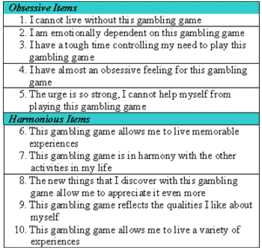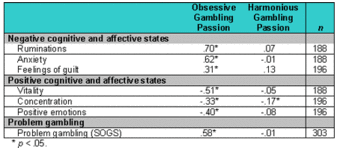Whether engaging in cooking, golf, or music, it is not uncommon for a person to feel passionately about a hobby. For most people, engaging their passions is a fulfilling, relaxing, and satisfying experience; certain levels of passion, however, have the potential to have a destructive effect. In a recent innovative study, Ratelle, Vallerand, Mageau, Rousseau, and Provencher (2004) examined whether subjects who cited passionate feelings toward gambling specifically exhibited positive (i.e., “harmonious”) or negative (i.e., “obsessive”) passions about gambling. They also explored whether problem gambling was more common among subjects with obsessive passion toward gambling. This week’s WAGER presents their results.
Ratelle et al. (2004) recruited 412 patrons (191 female, 219 men, 2 unspecified; mean age = 47 ± 16.5 years) at the Montréal Casino to participate in their study. All subjects completed the Gambling Passion Scale (GPS, Rousseau, Vallerand, Ratelle, Mageau, & Provencher, 2002), a 10 item questionnaire (see Appendix) that measures respondents’ obsessive and harmonious passions about gambling (i.e., 5 items each, using a 7-point Likert scale). Subjects also completed the South Oaks Gambling Screen (Lesieur & Blume, 1987) and various other questions designed to measure positive and negative cognitive and affective states associated with gambling (e.g., anxiety, guilt, rumination, vitality, concentration, etc.).
The authors found that the mean for the obsessive GPS items was 2.53 (SD = 1.58) and the mean for the harmonious items was 3.21 (SD = 1.36); these two subscales were significantly correlated (r = .39, p<.05). Partial correlations (i.e., using the other type of passion as the covariate) revealed significant positive correlations between obsessive passions and negative cognitive states (e.g., prruminations = .70, p<.05; see Table 1), suggesting an increase in obsessive passion when feelings of anxiety, guilt, rumination, among others also increase. Negative correlations, on the other hand, were found between obsessive passions and positive states (e.g., prvitality = .51, p<.05; see Table 1), suggesting a decrease in obsessive passion when feelings of vitality, positive emotions, and life satisfaction increase and vice versa. With one exception (i.e., concentration, which had a negative value for both harmonious and obsessive dimensions of gambling passion), harmonious passion was not significantly correlated to positive or negative cognitive states. Further, obsessive passion toward gambling positively correlated with SOGS scores (mean SOGS score = 3.86, SD = 4.08). Subjects who scored five or above on the SOGS (23%, n = 94) reported higher levels of both obsessive (F(1,302) = 137.1, p<.001) and harmonious (F(1,302) = 12.5, p<.001) passions than subjects who scored less than five, suggesting a relationship between problem gambling and an obsessive passion toward gambling.
Table 1. Partial correlations for obsessive and harmonious passion with cognitive and affective states and problem gambling (1) (Ratelle et al., 2004)
Obsessive passion predicted higher levels of problem gambling, higher levels of ruminations, anxiety, and guilt, and lower levels of concentration, vitality, and positive emotions. Harmonious passion toward gambling produced neither significant positive nor negative cognitive and affective states, perhaps as a result of the nature of gambling (i.e. the constant possibility of a negative consequence, like of losing money, may overshadow positive cognitive and affective states). Given these findings, the authors suggest that passion can be used as a measure for explaining psychological processes during an activity and predicting gambling outcomes.
There are several limitations to this study. First, the sample, from a single gaming location (i.e. Montréal Casino), is unlikely to be representative of the general gambling population. Further, because these results are correlational, we cannot determine which variable causes the other, even though the results suggest that obsessive passion and negative cognitive states are related. This study did not examine relationships between gambling passion and actual gambling behaviors (e.g., monetary loss, time spent gambling). It is unclear from this study whether subjects citing harmonious and obsessive gambling passion exhibit gambling behaviors different from subjects who do not indicate a passion for gambling. Behaviors often are different from self-reports of latent states (e.g., attitudes). Finally, though the Passion Scale has been described as having two separate subscales, namely harmonious and obsessive passion, it seems that these subscales could be degrees of the same scale. Further research could try to determine whether harmonious passion could grow into obsessive passion, or whether these types of passion are not general states but rather specific individual traits. Though the current form of the scale has been validated, there is the possibility that the data are related because the scales are related. Likewise the items in the obsessive scale look very similar to the SOGS items; the correlation between these variables might simply be the result of similar questions.
Nevertheless, this study provides an interesting perspective on the different ways individuals perceive gambling and the associated feelings they experience. This research also suggests different and important ways to understand the motivation for gambling and gambling-related disorders. New and more detailed theory is necessary to advance the field. For example, additional research into the determinants of gambling passions and their relationship to actual gambling behaviors could help to explain why certain people develop problems with gambling while others do not. Such research could ultimately lead scientists and clinicians to a deeper understanding of the emotional precursors to and warning signs of disordered gambling.
Comments on this article can be addressed to Siri Odegaard and Tony Donato.
Appendix

Gambling Passion Scale Items (Rousseau et al., 2002) (2)
Notes
1 Each set of correlations represents the relationship between the variables listed in the table rows and the type of passion specified, controlling for the influence of the other type of passion (e.g., the relationship between ruminations and obsessive gambling, once harmonious passion is taken into account).
2 The items are presented here ordered by categories; however version of the scale given to subjects intermingles the questions and categories.
References
Lesieur, H. R., & Blume, S. B. (1987). The South Oaks Gambling Screen (SOGS): A new instrument for the identification of pathological gamblers. American Journal of Psychiatry, 144(9), 1184-1188.
Ratelle, C. F., Vallerand, R. J., Mageau, G. A., Rousseau, F. L., & Provencher, P. (2004). When passion leads to problematic outcomes: A look at gambling. Journal of Gambling Studies, 20(2), 105-119.
Rousseau, F. L., Vallerand, R. J., Ratelle, C. F., Mageau, G. A., & Provencher, P. J. (2002). Passion and gambling: On the validation of the Gambling Passion Scale (GPS). Journal of Gambling Studies, 18(1), 45-66.





